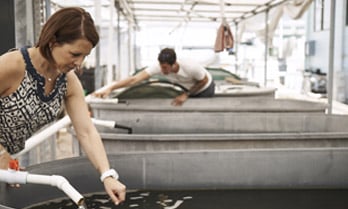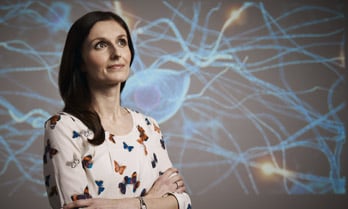







29 November 2023
Investigating “rogue” antibodies to uncover the driver mechanisms behind autoimmune diseases
Science was always on the brain, but not in the way Deborah practices now. Since she can remember, Deborah has always possessed an overt love of animals (she still fosters ringtail possums!) – and from the age of five, had only ever considered being a vet. Studying Veterinary Science at university and practicing in both Australia and New Zealand, Deborah was living out her dream. However, through her years as a vet, she grew more and more restless trying to understand why some animals were not as responsive as expected to the recommended treatment.
Deborah’s lightbulb moment came as she battled a sick Rottweiler in the clinic at 3am and was baffled as to why its autoimmune disease was not only unresponsive to treatment, but the dog’s illness was becoming worse. As such, Deborah cultivated a passion to be at the forefront of research, to understand why some animals do not respond to immune therapies. When Deborah began to understand the field of immunology, she realised that this understanding could also help her to explain the immune responses in humans – which led her to where she is today, studying the immune response in people to better develop and target medicine(s).
“This award supports my research into understanding why certain immune triggers result in the production of particular antibodies. I’m fascinated by learning how we can help the immune system better target difficult-to-fight threats and why in some situations, the immune response goes “rogue” and people develop autoimmune diseases following normal immune stimuli. Better understanding would allow us to prevent this from happening in the future and develop targeted therapies for these devastating immune diseases,” said Burnett.
Dr Burnett’s work has redefined the accepted role of B cells in vaccine responses against threats which mimic our own proteins, resulting in first-author publications in the journals Science, Immunity and PNAS which have since received 2 F1000 recommendations.
Her research has contributed vital insights to understanding autoimmune pathophysiology; being able to provide the experimental basis to support the listing of soluble CTLA 4 therapy as an effective precision medicine to treat LRBA-deficient children. This work was recognised as the ‘Publication of the Year’ in the ICB journal. Dr Burnett’s research continues in the field of comparative immunology in health and disease as she focuses on the sophisticated mouse models to understand the role of antibodies in healthy vaccine responses and in autoimmune disease.